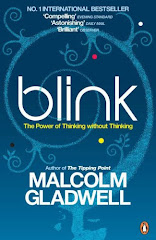
So I finished reading the book Dr. Beedy gave us, A Whole New Mind. Yes, I'm a nerd. But I got my copy early! I thought it was great, but maybe that's because my strengths lean toward the right-brained. One of my favorite quotes from the book is: "perspective is more important than IQ" (136). Another, in the same chapter: "The key to success is to risk thinking unconventional thoughts. Convention is the enemy of progress" (137). These ideas, and really the whole book, present us with the challenge to shift the way we teach and assess our students.



3 comments:
Although the"big picture" is important and the MFA is the new MBA, why is it we have to keep fighting for programs associated with the arts? Art is problem solving. All the disciplines influence and take part of the art making process. It requires the use of higher order thinking skills, but it is the first program to get cut, ignored, or go unsupported.
"Great"?! Give me break, Boss. Alexander was great. Shakespeare was a genius, Bede was Venerable, and Moby Dick is a whale of a good book.
Pink is just embarrassing.
I found the book superficial and insulting, starting with the fallacious first sentence.
Does Mr.Pink honestly believe that computer programmers are, in the terminology of pseudoneurology, left-brain dominant? That's just plain ignorance. (I'll let the lawyers out there defend themselves from the simultaneous slur.)
Pink's unquestioning acceptance of the New Age labyrinth hokum is just one example of the way that he trivializes the positive attributes that are associated with we so-called right brainers.
Laughter clubs? That makes me laugh. Can you imagine a life so devoid of joy that you have to get together with kindred spirits to laugh at nothing at all?
Mr. Pink tells us to take spirituality seriously. Amen to that, but I think that the shade of Victor Frankl would be appalled that his words are being used to strengthen Pink's paper-thin argument.
Victor Frankl - now there is one thing that Pink got right. He recommends Frankl's "Man's Search for Meaning", and so do I. It is a brilliant book that frequently says more important things about life one one sentence than Pink says in almost 250 pages.
Okay, I quibble. Most of Pink's advice is well-intended and harmless. Much of it is good. But there is little that is new here, and virtuality nothing that is not a rehash of all the self-actualization books that have come before.
Regarding Blink, the less said the better. The man argues out of both sides of his mouth, and never makes a cogent case for either position.
So, are there any books of this ilk that I would recommend? Sure; here are three recommendations from my summer reading list:
1. Coaching the Mental Game - by H.A. Dorfman - it has all the (sometimes irriating) cliches and cute sayings of this kind of book, but Dorfman pulls it off beautifully as he argues for inspirational, kind, and effective coaching.
2. Hard Facts, etc. - by Pfeffer & Sutton - these guys are the gurus of evidence-based management, and they make intelligent, detailed arguments for their research-supported suggestions. They make mincemeat of the Good-to-Great type studies that are based on flawed and even biased "research."
3. The Halo Effect - by Phil Rosenzweig : Phil skewers the authors of those quick-fix, 9-best-ways-to-succeed books with logic, insight, and facts, while still giving positive advice to business leaders.
A little lagniappe: If I were picking two books for upper school community reading, they might be:
The True Believer - by Eric Hoffer
Tragic Sense of Life - by Miguel de Unamuno
There you go gang - I've offered myself up as a a big old target who is just begging you to take aim. Hit me with your best shot, baby!
I rant on:
"Chess is in many ways the quinessential left-brain activity."
The above quote from Pink points out another major flaw in Pink's argument: he often gets his facts wrong because he doesn't do the research. A chess player uses a wide variety of brain areas, with no particular dominance by one side or the other. There's ample evidence of this from hooking up chessmasters' brains to machines and examining the mental activity.
Anyway, if you saw Bobby Fischer on the Today Show showing Dave Garroway and J. Fred Muggs a few chess strategies, the lightning speed of Bobby's moves would have convinced you that his chess skills were almost intuitive as opposed to logically analytic. It was as if he glanced at the board and "sensed" the right move (See, I can shovel this stuff too.)
Chess is not primarily a left side activity. That's a no-brainer.
One more thing: My man Pink stated back in 2004 that "an MFA is the new MBA." If that really is the case, then why do first-year MBA graduates still make about three or four times as much as first-year MFA grads?
And just one more thing: I know that DHP argues that we Americans need to use both sides of our brains and tries to avoid saying that one hemisphere is superior to the other. It's just that we need to exercise the right one more to achieve a balance in our mental activity.
Yeah, he says that, but look at the title of his book. He's got a bias that calls into question everything he writes.
Post a Comment